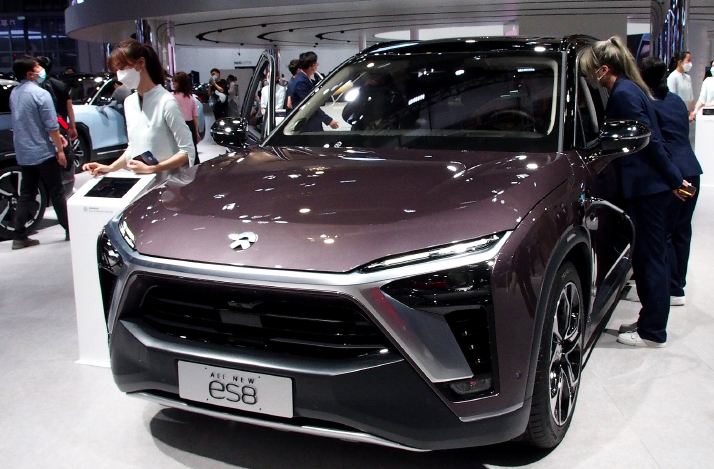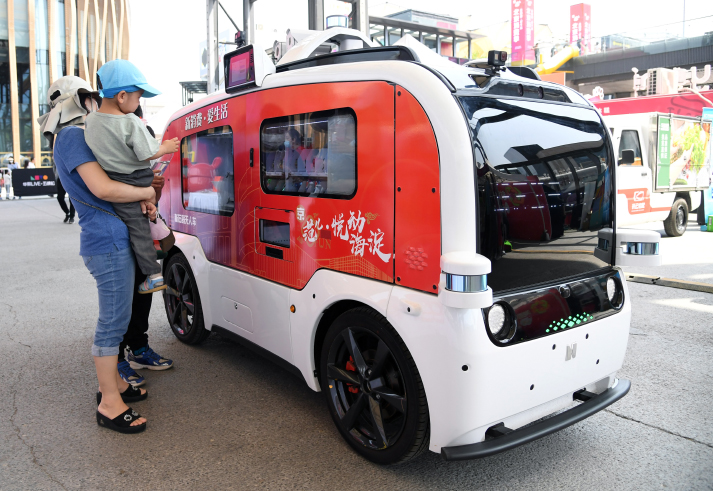| Business |
| Safety is the most important for electric and intelligent vehicles | |
|
|
 An electric vehicle is displayed at the 19th Shanghai International Automobile Industry Exhibition, which took place on April 21-28 (XINHUA)
As environmental protection becomes an increasingly common concern, and new technologies such as 5G and the Internet of Things continue to improve, more and more Chinese drivers are embracing electric and intelligent vehicles. In addition to U.S. electric carmaker Tesla, domestic startups such as Nio, Li Auto and Xpeng, as well as multinationals such as Volkswagen, have all expanded their market shares. According to the China Association of Automobile Manufacturers (CAAM), new-energy vehicles (NEVs) accounted for 2.06 percent of total auto ownership in China in the first half of 2021, numbering 6.03 million units. Of the registered NEVs, 4.93 million units, or 81.68 percent, were fully electric vehicles (EVs). Getting electrified Compared with gasoline-powered vehicles, EVs have the potential to be more energy-saving and environmentally friendly. As manufacturing technologies continue to improve, their global sales rose 41 percent year on year in 2020 and that growth is expected to strengthen, according to a report released by the International Energy Agency (IEA) in April. Boosted by supportive policies and improving battery industrial chains in recent years, EV sales in China have continued to expand, despite a decline in government subsidies since 2019. In response to the impact of COVID-19 on the market last year, the authorities extended purchase subsidies for NEVs from the end of 2020 to 2022. They also unveiled plans for NEVs to make up approximately 20 percent of new vehicle sales by 2025 and to completely electrify vehicles used in public transportation by 2035. This consistent support has driven the sector to see better-than-expected recovery from the pandemic. Electric vans and buses have also seen growing demand. The Ministry of Ecology and Environment said in October last year that China had replaced 60 percent of its buses with electric vehicles. According to the IEA, the number of electric cars, vans, trucks and buses on the world's roads could reach 145 million by 2030. Supporting facilities for the EV sector are also developing rapidly. As of April, 65,000 charging stations, 644 power swap stations and 1.87 million charging piles had been built across China. They covered 176 cities and more than 50,000 km of highway, the CAAM said. Battery swap stations allow drivers to conveniently exchange drained batteries for fully charged ones. China's lithium-ion battery output surged over 60 percent year on year in the first six months of this year, data from the Ministry of Industry and Information Technology showed. Contemporary Amperex Technology Co. Ltd. (CATL), the country's largest electric car battery maker, announced in February that it would invest up to 29 billion yuan ($4.5 billion) in capacity expansion. According to SNE Research, a research company based in the Republic of Korea, CATL ranks first among global battery makers, with a market share of 29.9 percent as of July. Driving intelligently As new technologies make intelligent connected vehicles (ICVs) a reality, many countries are stepping up efforts to develop this sector with the aim of becoming automotive powerhouses. According to a blueprint released last year, China aims to massively increase its production of autonomous and semi-autonomous vehicles by 2025. In July, the Ministry of Industry and Information Technology (MIIT) announced that tests and pilot applications of ICVs are allowed on open roads and highways amid efforts to ensure safety. Many automakers and tech companies have rolled out products with autonomous driving functionality. Baidu, currently China's largest AI company, conducted tests for its five fully driverless vehicles in Beijing in late 2020. By the end of the year, its test mileage had exceeded 2 million km, ranking first among domestic self-driving companies. The demand for self-driving vehicles in the logistics sector is also bringing business opportunities. According to Chinese autonomous driving startup Pony.ai, its trucks had hauled about 13,650 tons of freight over 37,466 km by July 2021. Neolix, another self-driving startup, has gone further by making autonomous vehicles to replace delivery staff and vendors.  People buy drinks at an autonomous vending vehicle in Beijing on June 6, 2020 (XINHUA)
Fending off risks Recently, Nio was mired in controversies surrounding its autonomous driving function. Lin Wenqin, founder of catering brand management firm Meiyihao, died in an accident on August 12 while using the autopilot system in his Nio ES8. On the same day, the MIIT introduced guidelines to improve data security of ICVs. It also called for improvements to safety management of vehicles with driving assistance and automated driving functions. On August 16, the U.S. National Highway Traffic Safety Administration also opened a preliminary investigation into Tesla's autopilot system after identifying 11 crashes involving the driver assistance system. Beginning in 2018, the incidents included one fatal crash and seven that resulted in injuries to 17 people. "Exaggerated advertising claims have misled some consumers. Currently, the autonomous driving technologies are still immature, so relying on them poses risks. For this reason, car manufacturers need to be transparent about the functionality of their products," Cui Dongshu, Secretary General of the China Passenger Car Association, told China News Service. Actually, the autonomous driving functionality advertised by many enterprises is assisted driving. Autonomous driving is divided into five levels by the U.S. Department of Transportation and the Society of Automotive Engineers. At Level 4, an autonomous vehicle can be driven on roads in specific areas without human intervention. Currently, autonomous driving of most EVs is at a lower level, at which human backup drivers must be ready to take over the navigation at all times, Pan Helin, Executive Director of the Digital Economy Academy at the Wuhan-based Zhongnan University of Economics and Law, said. "The recent accidents have uncovered problems in the sector. Instead of ceasing to adopt these new technologies, what carmakers need to do is to improve them," he told Beijing Review. Liu Wenting, a researcher with Beijing-based CCID Consulting, suggests EV makers slow down the research and development of new functions and instead focus on manufacturing. "Many EV enterprises focus more on creating new upgrades and seeking profits, while still lacking the manufacturing and management expertise of traditional automakers," she said. The safety of lithium batteries is also a major hurdle in the development of EVs. "While the batteries themselves are vulnerable to overcharging and external shocks, some enterprises seeking to improve endurance have reduced the weight and simplified the structure of their products, which can pose great risks," Liu said, adding that further supervision on EV enterprises is needed. According to Pan, recent autonomous driving-related accidents are mainly caused by unpredictable conditions on the road. For this reason, closed roads are safer for their use. While it's the responsibility of enterprises to make car functionality clear to consumers, the authorities should also play their part by improving regulation and enhancing road infrastructure. "For all carmakers, a measured approach is needed for business expansion. Since the manufacturing process involves the use of many components, they should enhance cooperation with component and technology suppliers to better ensure the quality of related products. Of course, the enterprises still need develop core technologies to improve competitiveness," Pan said. (Print Edition Title: No Easy Road Ahead) Copyedited by G.P. Wilson Comments to lixiaoyang@bjreview.com |
|
||||||||||||||||||||||||||||||
|